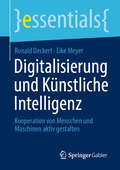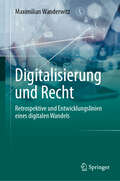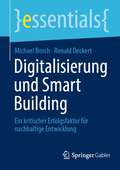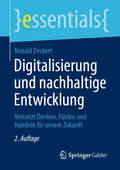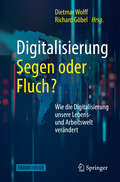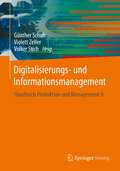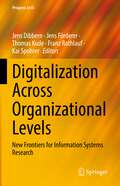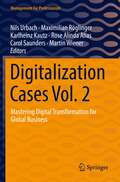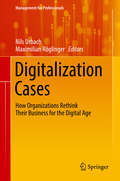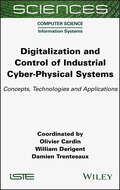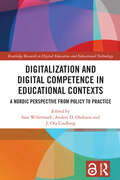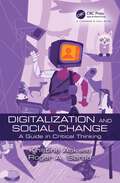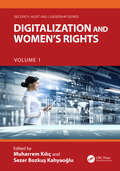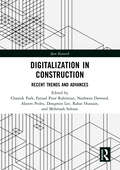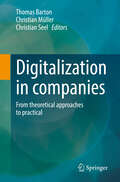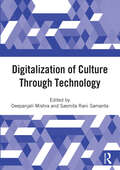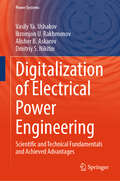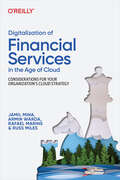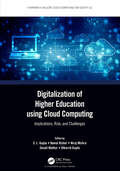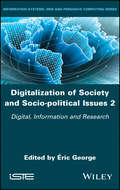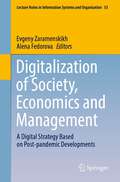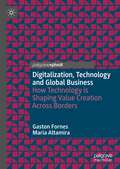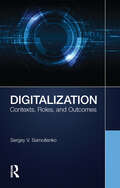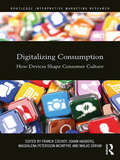- Table View
- List View
Digitalisierung und Künstliche Intelligenz: Kooperation von Menschen und Maschinen aktiv gestalten (essentials)
by Ronald Deckert Eike MeyerFür jeden von uns ist heute die Frage wichtig, wie in Zukunft Menschen und Maschinen zum Wohle des Menschen zusammenarbeiten und welche Anforderungen an Menschen hierbei entstehen. Dieses essential bietet für Interessierte den Einstieg. Wenn wir die Entwicklung in geeignete Bahnen lenken, dürfen wir dieser auch gespannt entgegensehen: Dann wirken – verbunden mit KI – Achtsamkeit, Anstrengung, Aufklärung, Anleitung und auch ein Stück weit Abenteuer im positiven Sinne zusammen.
Digitalisierung und Recht: Retrospektive und Entwicklungslinien eines digitalen Wandels
by Maximilian WanderwitzDas Werk skizziert Entwicklungslinien eines digitalen Wandels, der Folge einer Verschränkung von Digitalisierung und Recht ist. Durch Retrospektiven, Beschreibungen gegenwärtiger Zustände und gelegentlichen Prognosen wird illustriert, wie sich diese Entwicklungslinien von der Vergangenheit bis in die Zukunft erstrecken. Besonders untersucht werden hierbei die Reaktionen des Rechts auf den digitalen Wandel, die Transformation des Rechts und rechtlicher Arbeit durch die Digitalisierung, die Rolle des Menschen als digital beeinflusstes und erfasstes Wesen sowie umfassende Transformationsprozesse, denen Verwaltung und Rechtsstaat unterworfen sind. Einen speziellen Schwerpunkt bilden daneben Aspekte zur Künstlichen Intelligenz: ihre Funktionsweise, ihre Risiken, ihre Regulierung sowie die Möglichkeit ihres Schutzes. In einen größeren Rahmen eingepasst wird dies alles durch die Erörterung rechtstheoretischer Problemstellungen, rechtsstaatlicher und verfassungsrechtlicher Fragen sowie gesellschaftspolitischer Aspekte. Zahlreiche praktische Beispiele, Grafiken und Übersichten runden das Werk ab
Digitalisierung und Smart Building: Ein kritischer Erfolgsfaktor für nachhaltige Entwicklung (essentials)
by Ronald Deckert Michael BoschSmart Buildings sind intelligente, nachhaltige sowie mit ihrem ökologischen, ökonomischen und technologischen Umfeld vernetzte Gebäude, die ein Höchstmaß an Nutzerkomfort bieten und einen positiven Beitrag zum Umwelt- insbesondere auch Klimaschutz und damit für die Zukunft der Menschheit leisten. Ziel dieses essentials ist es, Projektentwicklern, Architekten, Fachplanern, Managern sowie Aufsichts- und Beiräten einen prägnanten Überblick über den Beitrag von Smart Buildings zur nachhaltigen Entwicklung zu ermöglichen.
Digitalisierung und nachhaltige Entwicklung: Vernetzt Denken, Fühlen und Handeln für unsere Zukunft (essentials)
by Ronald DeckertNachhaltige Entwicklung und Digitalisierung sind heute integriert zu betrachten. In diesem Kontext dient die Entfaltung persönlicher Stärken zugleich individueller Entwicklung wie auch der Bewältigung großer gesellschaftlicher Herausforderungen. Hierfür sind Bewegung, Ernährung, Konsum, Besitz, Energie und Engagement (#BEKBEE) sowie im Kontext Strategischer Mensch-Maschine-Partnerschaft (#StratMMP) die Kategorien Sinngebung, Kontrolle, Teilhabe, Design, Interaktion, Vernetzung und Intelligenz bedeutsam. Lernen erfolgt lebenslang und lebensweit und dies vor allem auch geprägt durch Vernetzung. Verbunden hiermit fängt vernetztes und vernetzendes Denken, Fühlen und Handeln für wirksame Veränderung bei einem selber an und dies am besten jetzt.
Digitalisierung: Wie Die Digitalisierung Unsere Lebens- Und Arbeitswelt Verändert
by Dietmar Wolff Richard GöbelDieses Buch befasst sich mit der digitalen Revolution und ihren Auswirkungen auf unsere Arbeits- und Lebenswelt. Die Autoren zeigen anhand anschaulicher Beispiele auf, wie die Digitalisierung unsere Arbeitsplätze und unser privates Umfeld verändert, welche Gefahren damit verbunden sind, aber auch welche Zukunftschancen darin liegen.Dieses Buch wird Sie interessieren, wenn Sie die Gefahren und Potenziale von Big Data und modernem Marketing sowie die notwendigen Hintergründe zur IT-Sicherheit und zum Datenschutz kennen möchten, an „4.0“ in Mittelstand und Industrie interessiert sind und zu den Visionen eines zukünftigen Gesundheits- und Bildungswesens mitgenommen werden wollen.Dabei sind keine fachlichen Vorkenntnisse in Informationstechnologie oder verwandten Gebieten erforderlich. Der Inhalt ist für ein fachfremdes, allgemeines Publikum geschrieben, das die technologischen Hintergründe der Digitalisierung verstehen möchte, um die Veränderungen im eigenen Umfeld verstehen und einordnen zu können. Mehr noch, da die Digitalisierung keinen Halt vor einer Berufsgruppe oder einem privaten Bereich macht, ist das Werk letztendlich für alle von Bedeutung.
Digitalisierungs- und Informationsmanagement: Handbuch Produktion und Management 9
by Günther Schuh Volker Stich Violett ZellerDie vernetzte Digitalisierung hat die produzierende Industrie fundamental verändert. Im Rahmen dessen eröffnen sich produzierenden Unternehmen kontinuierlich neue Chancen, in einem zunehmend dynamischen und durch das Internet geprägten Wettbewerb, wirtschaftliche Erfolge zu erzielen. Durch die veränderten Rahmenbedingungen der vernetzten Digitalisierung müssen produzierende Unternehmen jedoch neue Ansätze für die Organisation der digitalen Transformation verfolgen: Sie müssen die neue Führungsaufgabe Digitalisierungsmanagement gestalten. Dabei muss das Digitalisierungsmanagement eine breite Aufgabenvielfalt abdecken. Dieses Buch befähigt produzierende Unternehmen die digitale Transformation erfolgreich zu gestalten. Dazu werden Nutzen und Funktionsweisen der wesentlichen Aufgaben des Digitalisierungs- und Informationsmanagements praxisnah dargestellt. Ein spezifisch für produzierende Unternehmen, die eine digitale Transformation anvisieren, entwickeltes Digitalisierungs- und Informationsmanagement-Modell verknüpft schließlich die Inhalte. Das vorliegende Buch ist als ein Nachschlagewerk für Führungskräfte und Entscheider entwickelt worden, die die Herausforderungen der Realisierung von digitalen Geschäftsmodellen, digitalisierten Produkten und digitalen Geschäftsprozessen angehen wollen. Die Methoden in diesem Buch helfen dabei, die richtigen Managementaufgaben zu verfolgen und diese in der Unternehmensorganisation umzusetzen. Dabei werden auch die Schnittstellen zwischen dem strategischen Digitalisierungsmanagement und dem taktischen bis operativen Informationsmanagement behandelt. Das Buch bietet einen schnellen und einfachen Zugriff auf die wichtigsten Methoden und viele unterstützende Beispiele. Es ist Teil der Reihe „Handbuch Produktion und Management“ und ergänzt dessen Ordnungsrahmen.
Digitalization Across Organizational Levels: New Frontiers for Information Systems Research (Progress in IS)
by Kai Spohrer Jens Dibbern Franz Rothlauf Jens Förderer Thomas KudeThis book covers a broad range of topics related to digitalization. Specifically, it views digitalization across different organizational levels, such as the level of individuals, teams, processes, firms, and ecosystems. It includes a collection of recent research and reflections on the topic that helps to understand the technological foundations of digitalization and its impacts. It also reflects on the process of digitalization and how it changes established ways of working, collaborating, and coordinating.With this book, the editors and authors honor Professor Dr. Armin Heinzl for his enormous and ongoing contributions to information systems research, education, and practice.
Digitalization Cases Vol. 2: Mastering Digital Transformation for Global Business (Management for Professionals)
by Martin Wiener Carol Saunders Nils Urbach Maximilian Röglinger Karlheinz Kautz Rose Alinda AliasThis book presents a rich compilation of real-world cases on digitalization, aiming to share first-hand insights from renowned organizations and to make digitalization tangible. With all economic and societal sectors being challenged by emerging technologies, the digital economy is highly volatile, uncertain, complex, and ambiguous. It confronts established organizations with substantial challenges and opportunities. Against this backdrop, this book reports on best practices and lessons learned from organizations that succeeded in tackling the challenges and seizing the opportunities of the digital economy. It illustrates how twenty organizations leveraged their capabilities to create disruptive innovation, to develop digital business models, and to digitally transform themselves. These cases stem from various industries (e.g. automotive, insurance, consulting, and public services) and countries, covering the many facets that digitalization may have. As all case descriptions follow a unified template, they are easily accessible for readers and provide insightful examples for practitioners as well as interesting cases for researchers, teachers, and students. Almost every organization is trying to figure out how best to respond to the opportunities and threats posed by digitalization. This book provides valuable lessons from those organizations that have already begun their digital transformation journey.Michael D. Myers, Professor of Information Systems, University of AucklandDigitalization Cases provides firsthand insights into the efforts of renowned companies. The presented actions, results, and lessons learned are a great inspiration for managers, students, and academics. This book gives real pointers on the how and where to start.Anna Kopp, Head of IT Germany, MicrosoftThe cases compiled in the second volume of Digitalization Cases show how disruption can actively be managed. Further, long-term insights from extended success stories of the first edition highlight that courage to change pays off well. This book represents a motivation for organizations to drive their digital transformation journeys actively.Markus Richter, State Secretary at the Federal Ministry of the Interior, Building and Community and Federal Government Commissioner for Information Technology, Germany
Digitalization Cases: How Organizations Rethink Their Business for the Digital Age (Management for Professionals)
by Nils Urbach Maximilian RöglingerThis book presents a rich compilation of real-world cases on digitalization, the goal being to share first-hand insights from respected organizations and to make digitalization more tangible. As virtually every economic and societal sector is now being challenged by emerging technologies, the digital economy is a highly volatile, uncertain, complex and ambiguous place – and one that holds substantial challenges and opportunities for established organizations. Against this backdrop, this book reports on best practices and lessons learned from organizations that have succeeded in overcoming the challenges and seizing the opportunities of the digital economy. It illustrates how twenty-one organizations have leveraged their capabilities to create disruptive innovations, to develop digital business models, and to digitally transform themselves. These cases stem from various industries (e.g. automotive, insurance, consulting, and public services) and countries, reflecting the many facets of digitalization. As all case descriptions follow a uniform schema, they are easily accessible, and provide insightful examples for practitioners as well as interesting cases for researchers, teachers and students.Digitalization is reshaping business on a global scale, and it is evident that organizations must transform to thrive in the digital economy. Digitalization Cases provides first-hand insights into the efforts of renowned companies. The presented actions, results, and lessons learned are a great inspiration for managers, students, and academics.Anna Kopp, Head of IT Germany, MicrosoftUnderstanding digitalization in all its facets requires knowledge about its opportunities and challenges in different contexts. Providing 21 cases from different companies all around the world, Digitalization Cases makes an important contribution toward the comprehensibility of digitalization – from a practical and a scientific point of view.Dorothy Leidner, Ferguson Professor of Information Systems, Baylor UniversityThis book is a great source of inspiration and insight on how to drive digitalization. It shows easy to understand good practice examples which illustrate opportunities, and at the same time helps to learn what needs to be done to realize them. I consider this book a must-read for every practitioner who cares about digitalization.Martin Petry, Chief Information Officer and Head of Business Excellence, Hilti
Digitalization and Control of Industrial Cyber-Physical Systems: Concepts, Technologies and Applications
by Damien Trentesaux Olivier Cardin William DerigentIndustrial cyber-physical systems operate simultaneously in the physical and digital worlds of business and are now a cornerstone of the fourth industrial revolution. Increasingly, these systems are becoming the way forward for academics and industrialists alike. The very essence of these systems, however, is often misunderstood or misinterpreted. This book thus sheds light on the problem areas surrounding cyber-physical systems and provides the reader with the key principles for understanding and illustrating them.Presented using a pedagogical approach, with numerous examples of applications, this book is the culmination of more than ten years of study by the Intelligent Manufacturing and Services Systems (IMS2) French research group, part of the MACS (Modeling, Analysis and Control of Dynamic Systems) research group at the CNRS. It is intended both for engineers who are interested in emerging industrial developments and for master’s level students wishing to learn about the industrial systems of the future.
Digitalization and Digital Competence in Educational Contexts: A Nordic Perspective from Policy to Practice (Routledge Research in Digital Education and Educational Technology)
by Sara Willermark Anders D. Olofsson J. Ola LindbergThis edited collection presents a Nordic perspective on intensified discussions concerning digitalization and digital competence in the current trends of educational work. Using a multidisciplinary and holistic approach, the book compares Nordic countries’ attitudes towards the digitalization of education and demonstrates the Nordic region’s position as digital front-runners in a European and a global context. The book provides up-to-date cases and future-oriented perspectives on digitalization and digital competence in educational work. Chapters use empirical data gained from policy documents, interviews, and questionnaires to present nuanced discussions, theoretical perspectives, and implications for the future of digitalization in education. Ultimately, this book’s reach far exceeds that of its Nordic contexts and will be of use to postgraduate students, researchers, and scholars across the globe involved with digital education, teacher education, and educational policy and politics more broadly.
Digitalization and Social Change: A Guide in Critical Thinking
by Kristine Ask Roger Andre SøraaDigitalization is shaping our everyday lives, yet navigating the changes it entails can feel like trekking into the unknown, where both the possibilities and the consequences are unclear and difficult to grasp. Exploring how digitalization affects all aspects of our lives, from health to culture, this book aims to develop and strengthen the reader’s ability to think critically about such developments. Written in a clear and concise manner with reference to science fiction and pop culture, this book presents potent theoretical perspectives for understanding digitalization processes as societal change. Various exercises are included throughout to encourage readers to critically explore digitalization in their own lives. Replete with illustrations and examples, this book is an accessible guide to digitalization in the modern societal context, appealing to students at the undergraduate level as well as general readership.
Digitalization and Women's Rights: Volume 1 (Security, Audit and Leadership Series)
by Muharrem Kılıç and Sezer Bozkus̨ KahyaoğluTechnological advancements frequently hinder the progress of women in the business sphere. In our current landscape, the rapid evolution of technology—driven by digital transformation—has created significant barriers to women’s participation. This has given rise to new forms of discrimination that often go unacknowledged and unaddressed. The unfortunate reality is that this issue is sidelined in discussions about the economy and broader implications for employment. We must recognize and confront the unique challenges women face in this technological age, as their exclusion not only impacts them but also stifles innovation and growth in our economy. It is time to advocate for a more inclusive approach that empowers women in the tech world.In this vital context, it is essential to recognize the discrimination and emerging challenges that women will face, although these issues may not have been previously explored in sufficient detail. This work has been thoughtfully created to fill that gap, serving as a crucial reference about these matters. By shedding light on existing gaps in the research, this book promises to enrich future studies and provide invaluable insights for researchers who investigate and evaluate related works. One of the most pressing challenges ahead for women in the rapidly evolving digital landscape is understanding and navigating the economic opportunities available to them. As we enter this new era, women will undergo a transformative journey that demands adaptability and learning in the face of continuous innovation. This work aspires to contribute significantly to these conversations and empower women as they embrace the future.
Digitalization in Construction: Recent trends and advances (Spon Research)
by Farzad Pour Rahimian Nashwan Dawood Chansik Park Akeem Pedro Rahat Hussain Mehrtash Soltani Dongmin LeeThis book highlights the latest trends and advances in applications of digital technologies in construction engineering and management. A collection of chapters is presented, explicating how advanced technological solutions can innovatively address challenges and improve outcomes in the construction industry. Promising technologies that are highlighted include digital twins, virtual reality, augmented reality, artificial intelligence, robotics, blockchain, and distributed ledger technologies. The first section presents recent applications of extended reality technologies for construction education and advanced project control. The subsequent chapters explore Artificial Intelligence (AI), blockchain, and BIM-enabled digitalization in construction through a series of case studies, reviews, and technical studies. Innovative technologies and digitalized solutions are proposed for improved design, planning, training, monitoring, inspection, and operations management in Architectural, Engineering and Construction (AEC) contexts. In addition to the technological perspectives and insights presented, pressing issues such as decarbonization, safety, and sustainability in the built environment are also discussed. This book provides foundational knowledge and in-depth technical studies on emerging technologies for students, academics, and industry practitioners. The research demonstrates how the effective use of new technologies can enhance work methods, transform organizational structures, and bring profound advantages to construction project participants.
Digitalization in companies: From theoretical approaches to practical
by Thomas Barton Christian Müller Christian SeelThe book conveys current approaches to digitization in companies and shows how digitization projects can be successfully and safely implemented in practice. Based on the description of a changing value creation and working world, the changes associated with digitization are explained using application scenarios: New business models and business processes are being established, the development of products is changing as is the interaction with customers, new opportunities but also new risks are emerging. The authors of the article present the basics as well as concepts for the concrete planning and implementation of the digitization of processes and applications. Aspects of IT security are not neglected either. The editors' work is based on questions from entrepreneurial practice and is also suitable for students and teachers.
Digitalization of Culture Through Technology: Proceedings of the International Online Conference On Digitalization And Revitalization Of Cultural Heritage Through Information Technology- ICDRCT-21, 23-24 Nov 2021, KIIT University, Bhubaneswar
by Deepanjali Mishra Sasmita Rani SamantaIn the era of digitalization, the world has shrunk and has succeeded in bringing people closer than expected. It has provided a social platform which enables people to interact with an individual, group of users anywhere irrespective of time. It has assisted in various academic, non academic as well as social activities which has made lives more easier. Various researches have been conducted that explored the versatile use of the Internet by the language communities and there has been growing research with various strands based on the possibilities of new technologies for the revitalization as well as for the documentation and preservation of cultures. Digitalization could indeed be the best possible methodology to revive the indigenous culture and folk traditions and practices all over the world and would be useful to demonstrate innovative technologies and prototypes, including digital repositories, digital archives, virtual museums and digital libraries, which result from established practices and achievements in the field. This volume brings out the contributions of renowned researchers, academicians and folklorists across the globe. It will be a resource to all researchers, linguistics and learners in the field of Digitalization of Cultural Studies.
Digitalization of Electrical Power Engineering: Scientific and Technical Fundamentals and Achieved Advantages (Power Systems)
by Vasily Ya. Ushakov Ikromjon U. Rakhmonov Alisher B. Askarov Dmitriy S. NikitinThis book aims to provide readers with practical knowledge of the fundamentals of the &“digital transition&” concept, tools for designing and managing the operation of smart grids and substations, and critical issues in modernizing the energy sector. The inevitable transformation of the electric power industry is moving toward digitalization, which has taken the form of the concept of "Intelligent (smart) grids" (sometimes called "Digital Transition"). This has required coordinated work not only from the energy industry, but also from other stakeholders (government agencies, private firms, utilities, scientific and educational institutions, etc.) to solve numerous problems that arise during the transition to this advanced technology. It is obvious that the development of new components of energy systems, such as smart meters, monitoring and geolocation equipment, new disaster recovery systems, and energy storage systems, should be supplemented by the creation of the necessary communication infrastructure, modernization of existing network components, implementation of relevant regulations, training of highly qualified personnel. The book covers all the main tasks and ways to solve them for the implementation of this technology. It summarizes materials from numerous monographs, scientific articles, and conference reports discussing these issues.
Digitalization of Financial Services in the Age of Cloud: Considerations for Your Organization's Cloud Strategy
by Russ Miles Jamil Mina Armin Warda Rafael MarinsIf you're planning, building, or implementing a cloud strategy that supports digitalization for your financial services business, this invaluable guide clearly sets out the crucial factors and questions to consider first. With it, you'll learn how to avoid the costly and time-consuming pitfalls and disappointments of cloud adoption and take full advantage of the cloud operational model. You'll discover cloud tactics that unlock the benefits of digitalization and how to create a cloud strategy that has the flexibility to streamline operations, integrate channels, and encourage innovation in your firm.Packed with invaluable advice and real-world case studies, this book will show you how to:Select the right operational models for your needsBuild resilience into your company's technologiesAssess the trade-offs of third-party digital native services versus developing them in-houseEnsure operability across cloud services providersBalance innovation and accountabilityDeal with digitalization issues of particular importance in finance, such as governance, security, and regulatory complianceAnd more
Digitalization of Higher Education using Cloud Computing: Implications, Risk, and Challenges (Chapman & Hall/CRC Cloud Computing for Society 5.0)
by S. L. GuptaDigitalization of Higher Education using Cloud Computing: Implications, Risk, and Challenges provides an insight into the latest technology and tools being used to explore learning in Higher Educational Institutions (HEIs). Cloud computing, being an up-and-coming technology, integrates with academia and industry, thereby enhancing the quality of education. The opportunities and challenges faced by HEIs in recent times due to technological disruptions have forced both academia and industry to realign their strategies for survival and growth. With the acceleration of cloud computing in higher education, it has now become imperative for educators to constantly upskill and reskill in order to meet the requirements of the future of work, particularly in the digital age. Technological advancement is an unstoppable wave and the lack of relevant skills to handle the disruptions in higher education will become a huge challenge if not addressed promptly. This is the new phase of Education 4.0 where HEIs are aligning themselves using cloud computing implications, and thus are preparing both faculties and students to embrace the changes happening in the teaching and learning processes. This book focuses on multi-faceted strategies to be adopted by HEIs to deal with the emerging issues related to teaching–learning processes using cloud computing, technological interventions, curriculum overhaul, experiential learning, multi-disciplinary approaches, and continuous innovations and digitalization. The book offers comprehensive coverage of many academic areas, with the most essential topics including: • Pedagogies in digital education using a cloud environment • Risks and challenges in cloud platforms for teaching and learning • Collaborative and group learning in a cloud environment • Enhancing quality of education using e-learning methodologies The sections in this book are "Cloud Enabled Digitalization of Higher Education" and "Innovations and Applications of Digitalization of Higher Education: A Cloud Perspective". The book will be useful for undergraduates, graduates, academicians, scholars, and policy makers. It will help readers acquire skills for a smooth transition from face-to-face teaching to cloud-based teaching.
Digitalization of Society and Socio-political Issues 2: Digital, Information, and Research
by Éric GeorgeDigitalization is a long socio-historic process in which all areas of society's activities are reconfigured. In the first volume of Digitalization of Society and Socio-political Issues, there is an examination of the transformations linked to the development of digital platforms and social media which affect cultural and communicational industries. The book also analyzes the formation of Big Data, their algorithmic processing and the societal changes which result from them (social monitoring and control in particular). Through diverse critical reflections, it equally presents different ways that digital participates in relations of power and domination, and contributes to eventual emancipatory practices. Following on, the second volume examines the transformations that are linked to digital practices that affect the production, circulation and consumption of information, as well as new forms that are taken by social mobilizations. It treats several important issues in the digital era that are more likely to become the subject of public debates, among which one can include the renewed relationship between research and digital. Through diverse critical reflections, it equally presents different ways that digital participates in relations of power and domination, and contributes to eventual emancipatory practices.
Digitalization of Society, Economics and Management: A Digital Strategy Based on Post-pandemic Developments (Lecture Notes in Information Systems and Organisation #53)
by Evgeny Zaramenskikh Alena FedorovaThis book gathers the best papers presented at the third conference held by the Russian chapter of the Association for Information Systems (AIS), which took place in December 2021. The book shows the path to digital transformation of organizations and how possible obstacles can be overcome. With contributions from digital experts in both academia and IT and management, it presents practical frameworks and planning tools for new business models. It offers executives at the forefront of strategic initiatives a guide on how to implement key disruptive technologies in their organizations while following an established digital strategy. Overall, the book is relevant for scientists, digital technology users, companies and public institutions.
Digitalization, Technology and Global Business: How Technology is Shaping Value Creation Across Borders
by Gaston Fornes Maria AltamiraThis book explores the impact that changes brought by digitalization are having in the way global businesses are run and grown. The main changes in recent years have come from the ubiquitous presence of technology in our daily life (and therefore in business) and also by the direction globalization is taken. Consequently, companies need to review their sources of growth.This book has four primary missions. The first is to critically analyze the impact of digitalization and technology on incumbent international business theories. The second is to deeply understand how digitalization and technology can continue to create growth opportunities. The third is to engage with the opportunities and challenges that digital models and new technologies, digital platforms and Artificial Intelligence in particular, are bringing to the current business and economic environment. And finally, the fourth is to think on possible scenarios and trends that can be the source of growth in the future. This book will be of interest to academics of digital business, international business and innovation and society. It will also be of interest to practitioners and policymakers.
Digitalization: Contexts, Roles, and Outcomes
by Sergey V. SamoilenkoConceptually, as well as practically, digitalization is similar to the implementation of a modern computation model – the model may be a centralized setup using a mainframe or it may be extended to an N-tier architecture. Regardless of the specifics of the implementation, however, the conceptual model of data processing remains the same. Digitalization is nothing but a system relying on digital technologies to create, conduct and, potentially, expand a business activity of some sort. Digitalization can be used to create an e-commerce model for a small business or to create a global supply and distribution chain geared toward almost any kind of a business. It could also be used for non-profit purposes, such as on-line education and telemedicine or e-government. Digitalization: Contexts, Roles, and Outcomes is a contemplation and analysis of the socio-technical system that is known as digitalization. It considers the context of digitalization as well as the ways by which digitalization offers value to the context within which it operates. This book aims to offer readers an entry point to a path of inquiry into the different aspects of digitalization. The goal is to identify main directions for further inquiry as well as to outline the most obvious obstacles along the way. The book aims to guide readers on their own unique journeys using the basic ideas, principles, and concepts synthesized, developed, and presented in the book. It is beneficial to both practitioners and researchers. The book covers: The functionality of digitalization The significance of digitalization Identifying the context of digitalization Designing a control system A cognitive model for the theory of digitalization Designing a theory of digitalization The book helps readers to consider the subject of digitalization in a rigorous and rational way so their own perspectives can emerge stronger and be substantiated and reinforced by building an argument vis-à-vis perspectives and points examined in this book.
Digitalized and Harmonized Industrial Production Systems: The PERFoRM Approach
by Armando Walter Colombo Michael Gepp José Barata Paulo Leitao José Barbosa Jeffrey WermannOn the one side, Industrial competitiveness today means shorter product lifecycles, increased product variety, and shorter times to market and customized tangible products and services. To face these challenges, the manufacturing industry is forced to move from traditional management, control, and automation approaches towards industrial cyber-physical systems. On the other side, several emergent engineering approaches and related Information‐Communication‐Control‐Technologies, such as Multi‐Agent-Systems, Service‐Oriented Architecture, Plug‐and‐Produce Systems, Cloud and Fog Technologies, Big Data and Analytics, among others, have been researched during the last years. The confluence of those results with the latest developments in Industrial Digitalization, Systems‐of‐Cyber-Physical-Systems Engineering, Internet‐of‐Things, Internet‐of‐Services, and Industry 4.0 is opening a new broad spectrum of innovation possibilities. The PERFoRM (Production-harmonizEd-Reconfiguration of Flexible Robots and Machinery) approach is one of them. It teaches the reader what it means when production machines and systems are digitalized and migrated into Industrial Cyber-Physical Systems and what happens when they are networked and start collaborating with each other and with the human, using the internet. After a Technology Trend Screening and beyond a comprehensive state-of-the-art analysis about Industrial Digitalization and Industry 4.0-compliant solutions, the book introduces methods, architectures, and technologies applicable in real industrial use cases, explained for a broad audience of researchers, practitioners, and industrialists.
Digitalizing Consumption: How devices shape consumer culture (Routledge Interpretive Marketing Research)
by Franck Cochoy Johan Hagberg Magdalena Petersson McIntyre Niklas SörumContemporary consumer society is increasingly saturated by digital technology, and the devices that deliver this are increasingly transforming consumption patterns. Social media, smartphones, mobile apps and digital retailing merge with traditional consumption spheres, supported by digital devices which further encourage consumers to communicate and influence other consumers to consume. Through a wide range of empirical studies which analyse the impact of digital devices, this volume explores the digitization of consumption and shows how consumer culture and consumption practices are fundamentally intertwined and mediated by digital devices. Exploring the development of new consumer cultures, leading international scholars from sociology, marketing and ethnology examine the effects on practices of consumption and marketing, through topics including big data, digital traces, streaming services, wearables, and social media’s impact on ethical consumption. Digitalizing Consumption makes an important contribution to practice-based approaches to consumption, particularly the use of market devices in consumers’ everyday consumer life, and will be of interest to scholars of marketing, cultural studies, consumer research, organization and management.
